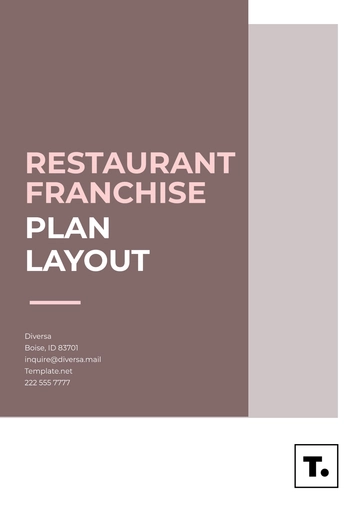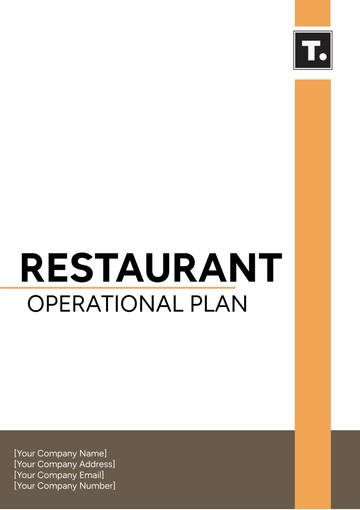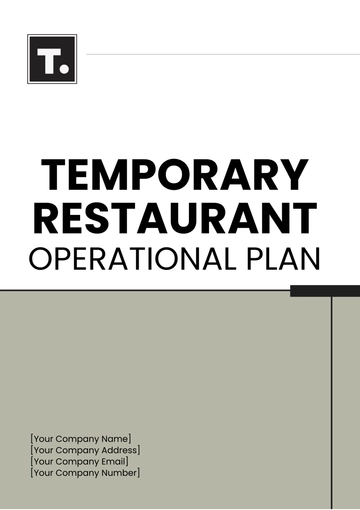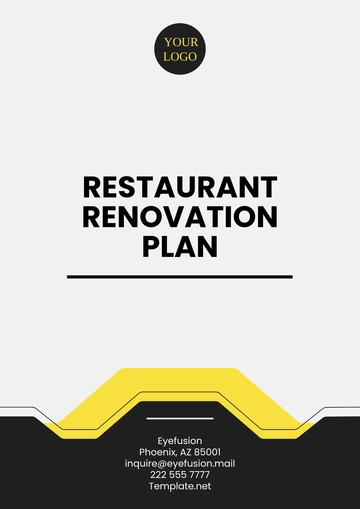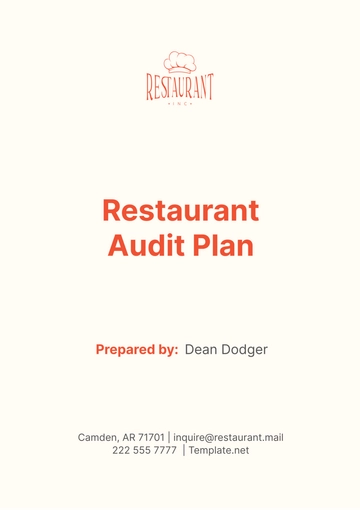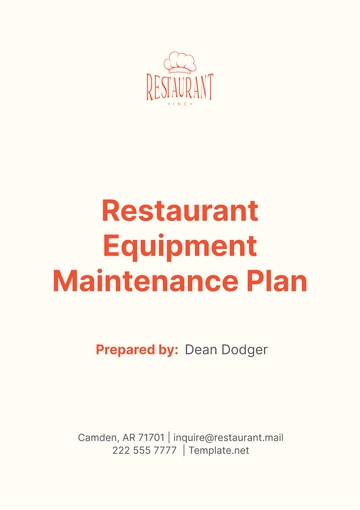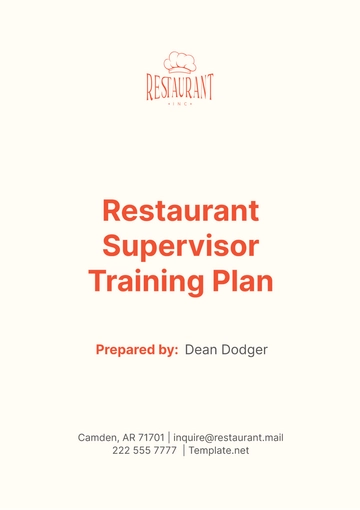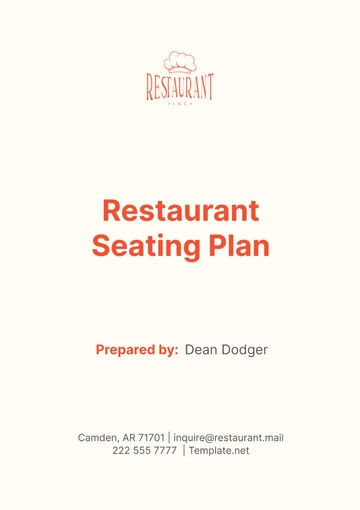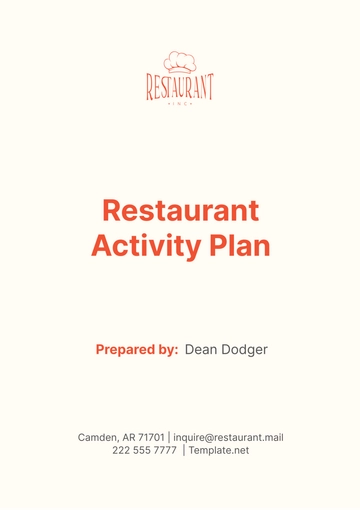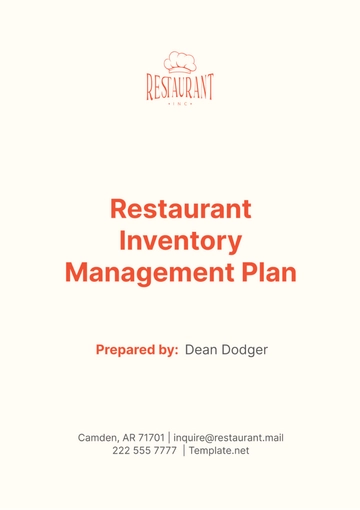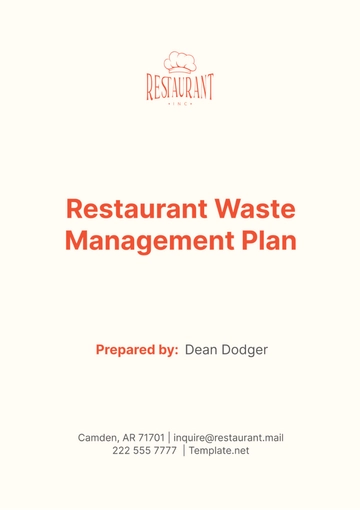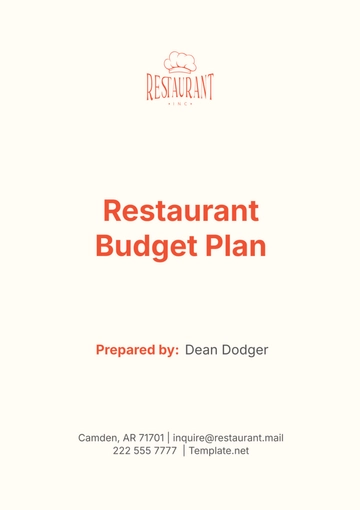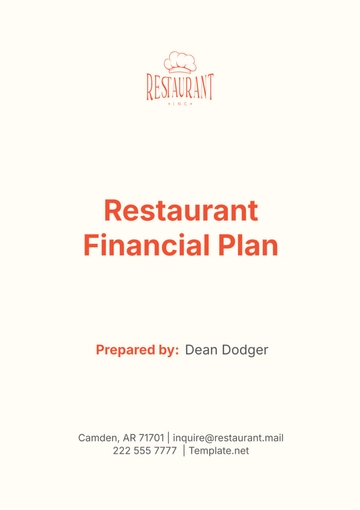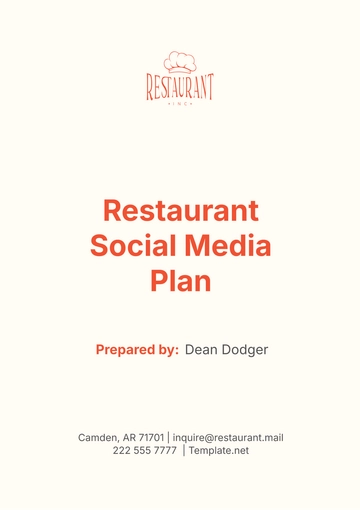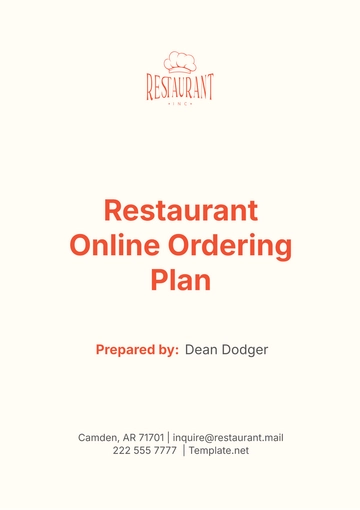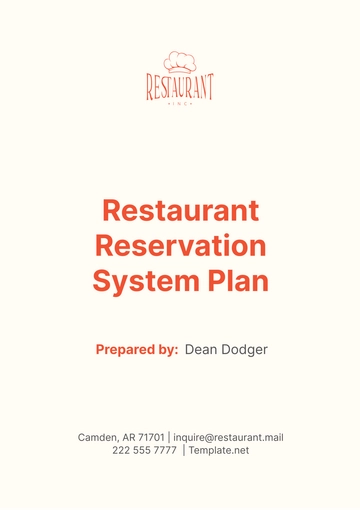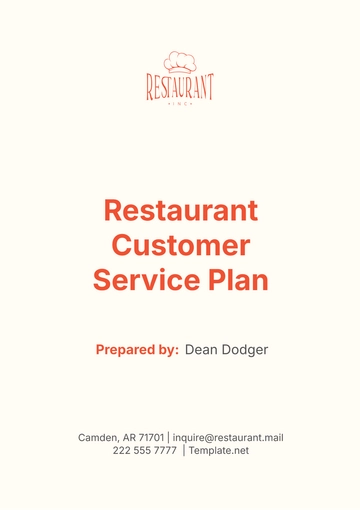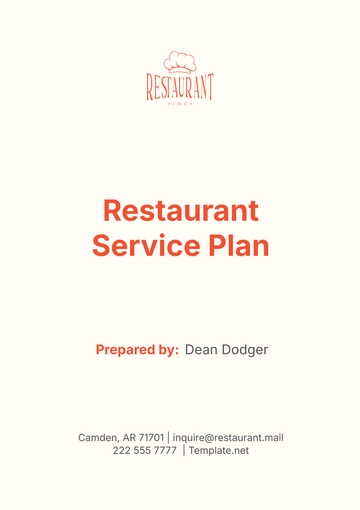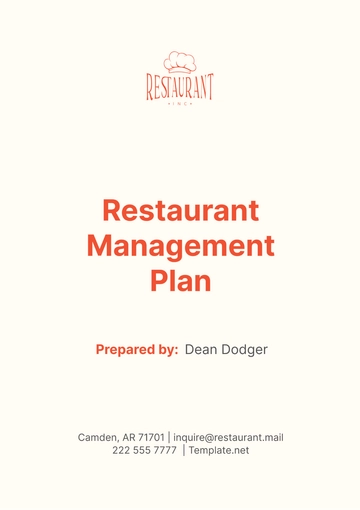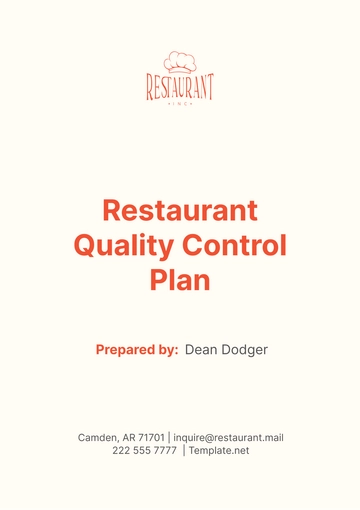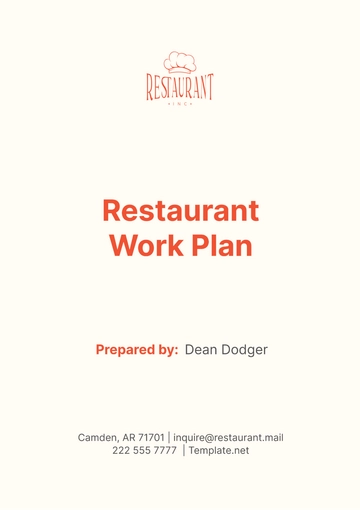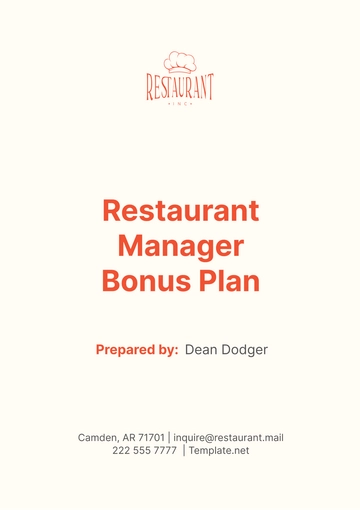Free Restaurant Supervisor Training Plan
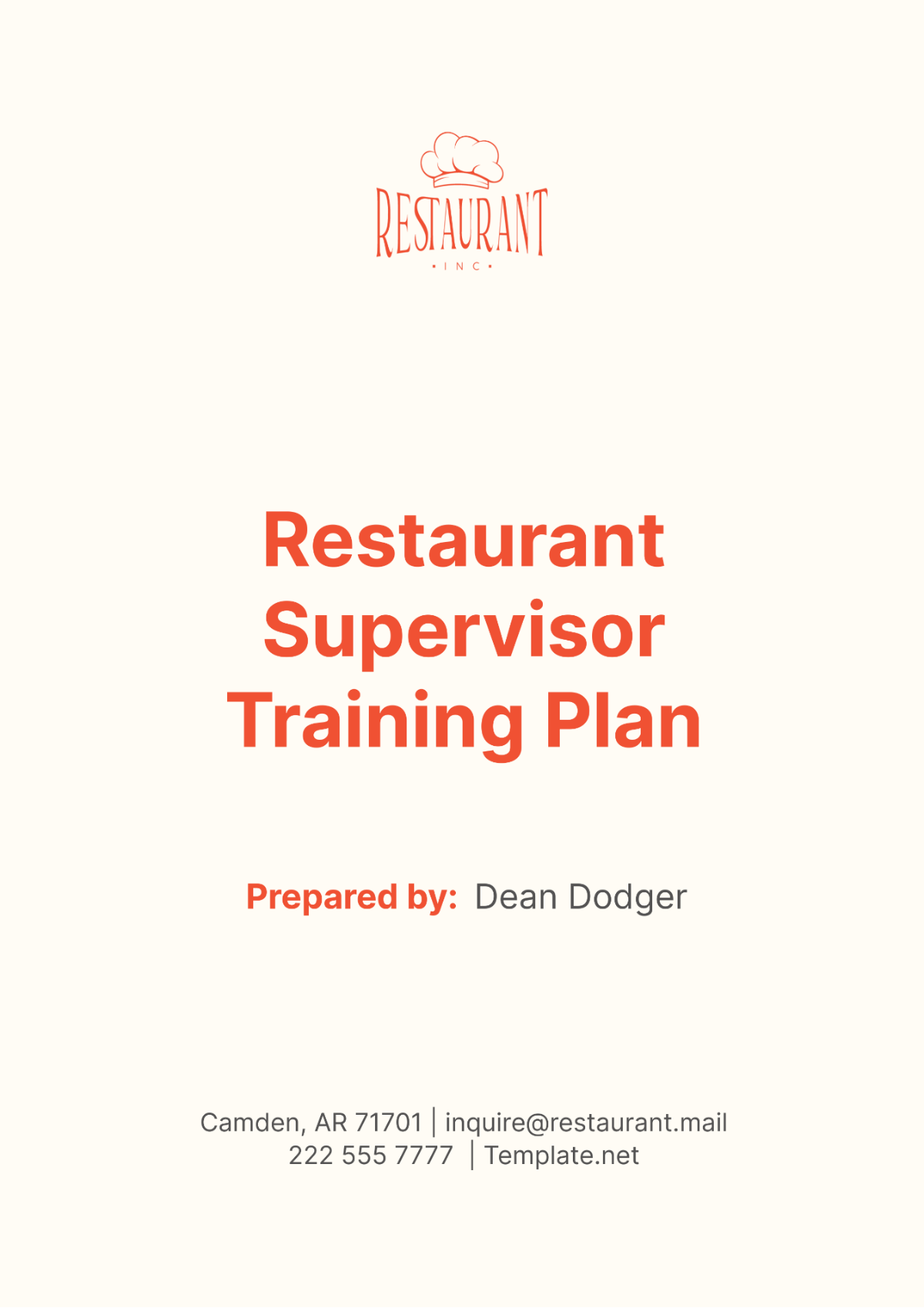
I. Overview
A. Introduction
Welcome to the Restaurant Supervisor Training Plan of [Your Company Name]. This comprehensive training plan is designed with the aim of equipping new supervisors with the necessary skills and knowledge to effectively lead our restaurant team. It provides a structured approach to learning, ensuring that supervisors are well-prepared to take on their roles.
The training plan is tailored to the unique needs and challenges of the restaurant industry. It covers a wide range of topics, from understanding the restaurant's policies and procedures to developing leadership and management skills. The goal is to provide supervisors with a well-rounded understanding of their role and the tools they need to succeed.
B. Purpose
The purpose of this training program extends beyond just understanding roles and responsibilities. It is designed to ensure that all supervisors are familiar with [Your Company Name]'s policies and procedures, can perform their duties to the highest standard, and are equipped to handle the dynamic challenges of the restaurant industry. This training program is a crucial step in their professional development and prepares supervisors to lead their teams effectively.
C. Objectives
By the end of this training program, supervisors will be able to:
Understand Company Policies and Procedures: Supervisors will gain a comprehensive understanding of [Your Company Name]'s policies and procedures. This includes those related to attendance, dress code, and performance expectations.
Manage and Lead Team Members: The training program will equip supervisors with the skills necessary to effectively manage and lead team members. This includes fostering a positive and productive work environment, resolving conflicts, and motivating team members to perform their best.
Oversee Daily Restaurant Operations: Supervisors will learn how to oversee daily restaurant operations. This includes managing schedules, overseeing food preparation, and ensuring compliance with health and safety regulations. These skills are crucial for maintaining the smooth running of the restaurant.
Handle Customer Inquiries and Complaints: The training program will equip supervisors with the skills to handle customer inquiries and complaints effectively. This includes understanding how to communicate with customers, resolve issues, and ensure an exceptional dining experience for all guests.
Ensure Compliance with Health and Safety Regulations: Supervisors will learn about the importance of health and safety regulations in the restaurant industry. They will understand how to ensure compliance with these regulations, creating a safe and healthy environment for both staff and customers.
II. Training Schedule
A. Training Duration
The training program is designed to be comprehensive yet efficient. It will span over a period of four weeks, starting from January 1, 2050, and concluding on January 28, 2050. The four-week period ensures that each topic is given ample time for thorough understanding, while also providing enough time for practical application and feedback. This duration allows for in-depth coverage of all necessary topics while also respecting the time commitments of our supervisors.
B. Weekly Breakdown
The training program is broken down into weekly segments, each focusing on a specific area of training. The following table provides a detailed breakdown of the topics and the respective weeks and instructors:
Week | Topics Covered | Instructor |
|---|---|---|
Week 1 | Introduction to Company Policies and Procedures | Jane Hopkins |
Week 2 | Leadership and Management Skills | Brad Smith |
Week 3 | Daily Operations and Compliance | Lucy Grey |
Week 4 | Customer Service Excellence | John Whitman |
Each week of the training program is designed with a specific focus. The first week introduces the company policies and procedures, laying the groundwork for the rest of the training. The second week focuses on leadership and management skills, crucial for any supervisor role. The third week delves into the daily operations and compliance, providing practical knowledge about the workings of the restaurant. The final week is dedicated to customer service excellence, a key aspect of the restaurant industry.
The weekly breakdown of the training program plays a crucial role in ensuring a comprehensive and effective learning experience. It not only provides a clear roadmap for the supervisors but also ensures that the training is well-paced and well-rounded. By focusing on different topics each week, we ensure that our supervisors are well-equipped to handle all aspects of their role, from understanding company policies to leading their teams and ensuring customer satisfaction.
III. Training Content
The training content is designed to provide supervisors with a comprehensive understanding of their roles and responsibilities, as well as the skills needed to effectively manage and lead their teams. The content is divided into four main sections, each focusing on a different aspect of the supervisor role:
A. [Your Company Name]'s Policies and Procedures
Understanding Policies: Supervisors will gain a comprehensive understanding of [Your Company Name]'s policies. This includes policies related to attendance, dress code, and performance expectations. Understanding these policies is crucial for supervisors to effectively manage their teams and uphold the standards of [Your Company Name].
Understanding Procedures: In addition to policies, supervisors will also learn about the restaurant's procedures. This includes procedures for handling customer complaints, managing staff, and dealing with emergencies. Familiarity with these procedures ensures that supervisors can handle a variety of situations effectively and in line with company standards.
Compliance with Policies and Procedures: Supervisors will be trained on the importance of complying with these policies and procedures. They will learn how to ensure their team’s compliance and handle any violations appropriately.
Updating Policies and Procedures: Supervisors will also learn about the process for updating policies and procedures. This includes understanding when updates are necessary, how to implement them, and how to communicate them to the team.
B. Leadership and Management Skills
Developing Leadership Skills: The training program will equip supervisors with essential leadership skills. This includes learning how to motivate and inspire their teams, make effective decisions, and lead by example.
Developing Management Skills: In addition to leadership skills, supervisors will also develop key management skills. This includes skills such as problem-solving, conflict resolution, and time management. These skills are crucial for managing the day-to-day operations of the restaurant and ensuring a smooth and efficient service.
Team Building: Supervisors will learn about the importance of team building and how to foster a positive and collaborative team culture. This includes understanding team dynamics, promoting teamwork, and resolving team conflicts.
Performance Management: Supervisors will also learn about performance management. This includes setting performance expectations, providing feedback, and managing performance issues.
C. Daily Operations and Compliance
Overseeing Daily Operations: Supervisors will learn how to oversee daily restaurant operations. This includes managing schedules, overseeing food preparation, and ensuring a high level of customer service. These skills are crucial for maintaining the smooth running of the restaurant.
Ensuring Compliance: Supervisors will also learn about the importance of compliance with health and safety regulations. They will understand how to ensure compliance within their teams, creating a safe and healthy environment for both staff and customers.
Inventory Management: Supervisors will be trained on inventory management. This includes understanding how to manage stock levels, order supplies, and minimize waste.
Financial Management: Supervisors will also learn about financial management. This includes understanding how to manage budgets, control costs, and analyze financial performance.
D. Customer Service Excellence
Handling Customer Inquiries: The training program will equip supervisors with the skills to handle customer inquiries effectively. This includes understanding how to communicate with customers, resolve issues, and ensure an exceptional dining experience for all guests.
Handling Customer Complaints: In addition to handling inquiries, supervisors will also learn how to handle customer complaints. This involves understanding how to listen to and empathize with customers, find effective solutions to their problems, and ensure their satisfaction with the resolution.
Promoting Customer Loyalty: Supervisors will learn about the importance of customer loyalty and how to promote it. This includes understanding how to provide excellent customer service, handle customer feedback, and implement loyalty programs.
Managing Customer Expectations: Supervisors will also learn about managing customer expectations. This includes understanding how to set realistic expectations, meet or exceed these expectations, and handle situations where expectations are not met.
IV. Evaluation and Certification
The evaluation and certification process ensures that the supervisors have successfully acquired the necessary skills and knowledge from the training program and are ready to take on their roles effectively.
A. Assessment Methods
The assessment methods used in this training program are designed to measure the progress and effectiveness of the training. They include:
Quizzes: Quizzes are used to assess the supervisors’ understanding of the theoretical aspects of the training content. They provide immediate feedback and help identify areas where further clarification or review may be needed.
Practical Demonstrations: Practical demonstrations allow supervisors to showcase their skills in a real-world context. This could involve demonstrating their ability to handle a customer complaint, manage a team, or oversee daily operations.
Performance Reviews: Performance reviews are conducted to assess the supervisors’ application of the skills and knowledge gained during the training. This involves observing the supervisors in their roles and providing constructive feedback to help them improve.
B. Certification
Certification is an important part of the training program. It serves as a testament to the supervisors’ successful completion of the training and their readiness to assume their roles.
Certification Criteria: To receive certification, supervisors must successfully complete all components of the training program and pass all assessments. This ensures that only those who have fully mastered the training content receive certification.
Issuance of Certification: Upon successful completion of the training program, supervisors will receive a certification from [Your Company Name]. This certification serves as a formal recognition of their skills and knowledge.
Value of Certification: The certification not only validates the supervisors’ capabilities but also enhances their credibility. It shows that they have undergone rigorous training and are equipped to handle the responsibilities of their role.
Continued Professional Development: The certification also contributes to the supervisors’ continued professional development. It can be added to their professional portfolio and used to demonstrate their commitment to learning and excellence.
V. Feedback and Continuous Improvement
A. Feedback Mechanism
At [Your Company Name], we believe that feedback is a crucial part of the learning process. Therefore, we encourage participants to provide feedback at the end of each training session. This can be done through the Training Feedback Form, which is designed to capture participants’ thoughts on the training content and delivery. The feedback collected will be used to:
Identify Strengths and Weaknesses: Feedback helps us identify the strengths and weaknesses of our training program. It highlights the areas where we excel and the areas where improvement is needed.
Improve Training Content and Delivery: Based on the feedback, we can make necessary adjustments to our training content and delivery methods. This ensures that our training program remains relevant, effective, and engaging.
Measure Training Effectiveness: Feedback provides valuable insights into the effectiveness of our training program. It helps us understand whether the training objectives are being met and whether the participants are finding the training useful.
Plan Future Training Programs: The feedback collected will also be used to plan future training programs. It helps us understand the evolving training needs of our supervisors and plan our training programs accordingly.
B. Post-Training Support
After the completion of the training program, the learning journey doesn’t end. At [Your Company Name], we provide ongoing support and resources to our supervisors. This includes:
Follow-up Workshops: These workshops are designed to reinforce the skills and knowledge gained during the training program. They provide an opportunity for supervisors to revisit the training content, clarify doubts, and share their experiences.
Access to Mentoring Programs: Our mentoring programs provide supervisors with the opportunity to learn from experienced leaders within [Your Company Name]. These programs can provide valuable insights, advice, and guidance.
Continuous Learning Opportunities: Through the restaurant's Learning Management System, supervisors will have access to a wide range of learning resources. This includes online courses, webinars, articles, and more. These resources support continuous learning and professional development.
Community of Practice: Supervisors will be part of a community of practice where they can connect with other supervisors, share experiences, and learn from each other. This community fosters a culture of learning and collaboration within [Your Company Name].
- 100% Customizable, free editor
- Access 1 Million+ Templates, photo’s & graphics
- Download or share as a template
- Click and replace photos, graphics, text, backgrounds
- Resize, crop, AI write & more
- Access advanced editor
Develop effective training programs with the Restaurant Supervisor Training Plan Template here on Template.net! This editable template can be tailored to specific training needs. Its customizable sections ensure thorough coverage of all necessary skills, while the integrated AI Editor Tool helps create detailed and professional training plans! Edit right away!
You may also like
- Finance Plan
- Construction Plan
- Sales Plan
- Development Plan
- Career Plan
- Budget Plan
- HR Plan
- Education Plan
- Transition Plan
- Work Plan
- Training Plan
- Communication Plan
- Operation Plan
- Health And Safety Plan
- Strategy Plan
- Professional Development Plan
- Advertising Plan
- Risk Management Plan
- Restaurant Plan
- School Plan
- Nursing Home Patient Care Plan
- Nursing Care Plan
- Plan Event
- Startup Plan
- Social Media Plan
- Staffing Plan
- Annual Plan
- Content Plan
- Payment Plan
- Implementation Plan
- Hotel Plan
- Workout Plan
- Accounting Plan
- Campaign Plan
- Essay Plan
- 30 60 90 Day Plan
- Research Plan
- Recruitment Plan
- 90 Day Plan
- Quarterly Plan
- Emergency Plan
- 5 Year Plan
- Gym Plan
- Personal Plan
- IT and Software Plan
- Treatment Plan
- Real Estate Plan
- Law Firm Plan
- Healthcare Plan
- Improvement Plan
- Media Plan
- 5 Year Business Plan
- Learning Plan
- Marketing Campaign Plan
- Travel Agency Plan
- Cleaning Services Plan
- Interior Design Plan
- Performance Plan
- PR Plan
- Birth Plan
- Life Plan
- SEO Plan
- Disaster Recovery Plan
- Continuity Plan
- Launch Plan
- Legal Plan
- Behavior Plan
- Performance Improvement Plan
- Salon Plan
- Security Plan
- Security Management Plan
- Employee Development Plan
- Quality Plan
- Service Improvement Plan
- Growth Plan
- Incident Response Plan
- Basketball Plan
- Emergency Action Plan
- Product Launch Plan
- Spa Plan
- Employee Training Plan
- Data Analysis Plan
- Employee Action Plan
- Territory Plan
- Audit Plan
- Classroom Plan
- Activity Plan
- Parenting Plan
- Care Plan
- Project Execution Plan
- Exercise Plan
- Internship Plan
- Software Development Plan
- Continuous Improvement Plan
- Leave Plan
- 90 Day Sales Plan
- Advertising Agency Plan
- Employee Transition Plan
- Smart Action Plan
- Workplace Safety Plan
- Behavior Change Plan
- Contingency Plan
- Continuity of Operations Plan
- Health Plan
- Quality Control Plan
- Self Plan
- Sports Development Plan
- Change Management Plan
- Ecommerce Plan
- Personal Financial Plan
- Process Improvement Plan
- 30-60-90 Day Sales Plan
- Crisis Management Plan
- Engagement Plan
- Execution Plan
- Pandemic Plan
- Quality Assurance Plan
- Service Continuity Plan
- Agile Project Plan
- Fundraising Plan
- Job Transition Plan
- Asset Maintenance Plan
- Maintenance Plan
- Software Test Plan
- Staff Training and Development Plan
- 3 Year Plan
- Brand Activation Plan
- Release Plan
- Resource Plan
- Risk Mitigation Plan
- Teacher Plan
- 30 60 90 Day Plan for New Manager
- Food Safety Plan
- Food Truck Plan
- Hiring Plan
- Quality Management Plan
- Wellness Plan
- Behavior Intervention Plan
- Bonus Plan
- Investment Plan
- Maternity Leave Plan
- Pandemic Response Plan
- Succession Planning
- Coaching Plan
- Configuration Management Plan
- Remote Work Plan
- Self Care Plan
- Teaching Plan
- 100-Day Plan
- HACCP Plan
- Student Plan
- Sustainability Plan
- 30 60 90 Day Plan for Interview
- Access Plan
- Site Specific Safety Plan
